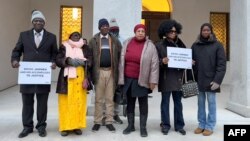Sonko’s trial will take place under the principle of universal jurisdiction, which allows a foreign country to prosecute crimes against humanity, war crimes and genocide regardless of where they were committed.
The case is being heard at the Federal Criminal Court of Switzerland, in the southern city of Bellinzona, where proceedings should last a month and the verdict unlikely to be delivered before March.
If convicted, Sonko could face life imprisonment. He denies all the charges.
Sonko oversaw the office of interior minister from 2006 until 2016, under the leadership of Jammeh who governed the West African nation with an iron grip from 1994 to 2016.
The former interior minister has been in custody since his arrest in Switzerland in January 2017 after applying for asylum following his sacking from the post.
Sonko, who turns 55 on Tuesday, was detained after a complaint by the Geneva-based NGO Trial International.
He can face trial in Switzerland because in 2011, the Alpine nation recognized the right to judge the most serious crimes alleged to have taken place abroad — providing the suspect is on Swiss soil.
"This trial is a significant moment in Swiss judicial history, being only the second trial for crimes against humanity in the country," said Trial International president Leslie Haskell.
"Ousman Sonko will also be the highest-ranking state official ever to be tried for international crimes under the principle of universal jurisdiction in Europe."
Following a criminal investigation lasting more than six years, in April last year the Office of the Attorney General of Switzerland filed an indictment against Sonko.
The former minister is accused of "having supported, participated in and failed to prevent systematic and generalized attacks as part of the repression carried out by the Gambian security forces against all opponents of the regime."
The charges span a 16-year period and include nine counts of crimes against humanity.
Sonko is accused of having "deliberately killed, tortured, raped and unlawfully deprived individuals of their liberty in a serious manner."
There are 10 complainants in the case, according to Trial International, including eight "direct victims" and the daughter of a person who died in detention.
Another complainant died last year, but their successors have continued with the case.
"This trial offers hope for the victims of several decades of repression in The Gambia to get answers about the crimes committed against the Gambian population," Trial's legal adviser Benoit Meystre said.
Sonko is accused of having committed the alleged crimes in his roles first within the army, then as inspector general of the police and finally as a government minister.
His lawyer, Philippe Currat says responsibility for the events on the charge sheet lies with the national intelligence agency and not Sonko.
"This agency has never been under the authority or control, in fact or law, of Ousman Sonko," Currat said.
The defense also intends to argue that some of the allegations must be excluded because they pre-date 2011, when crimes against humanity became enshrined in Swiss law.
This point is expected to dominate Monday's hearings.
Caroline Renold, a lawyer for three of the complainants, alleged that Sonko "played a key role in implementing the repression of the civilian population" and "is accused of having directly participated in atrocities."







Forum